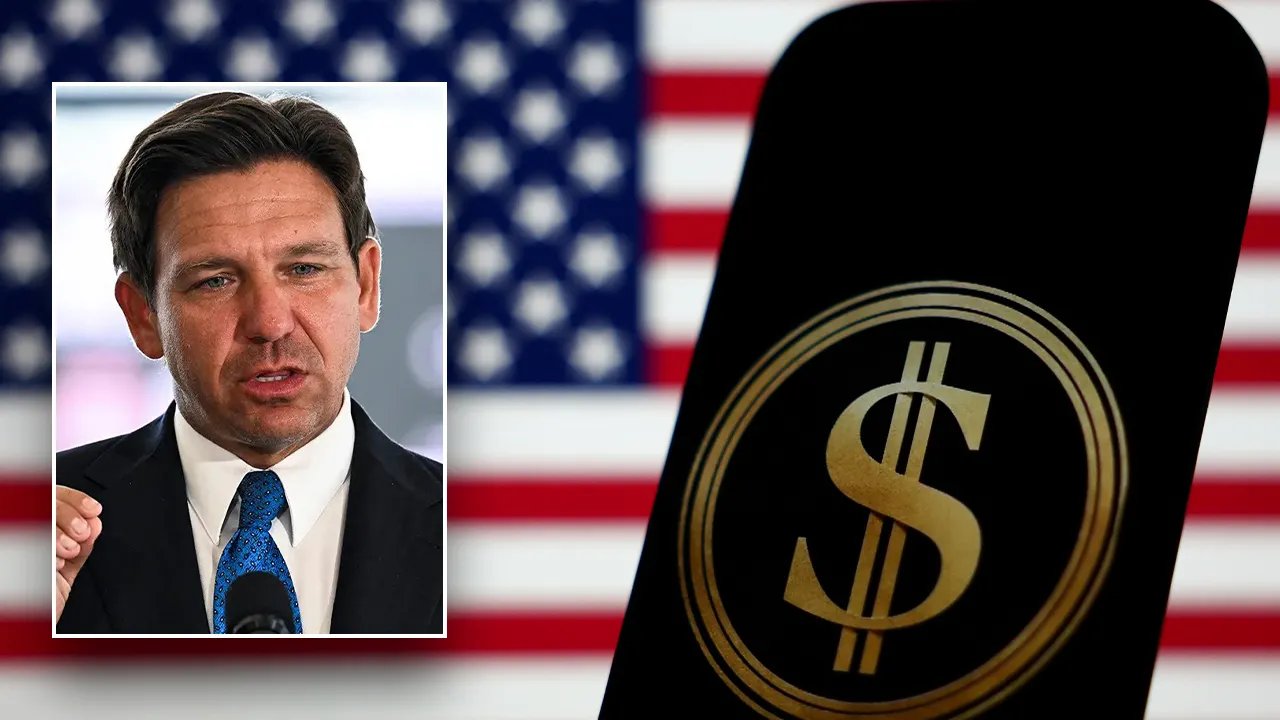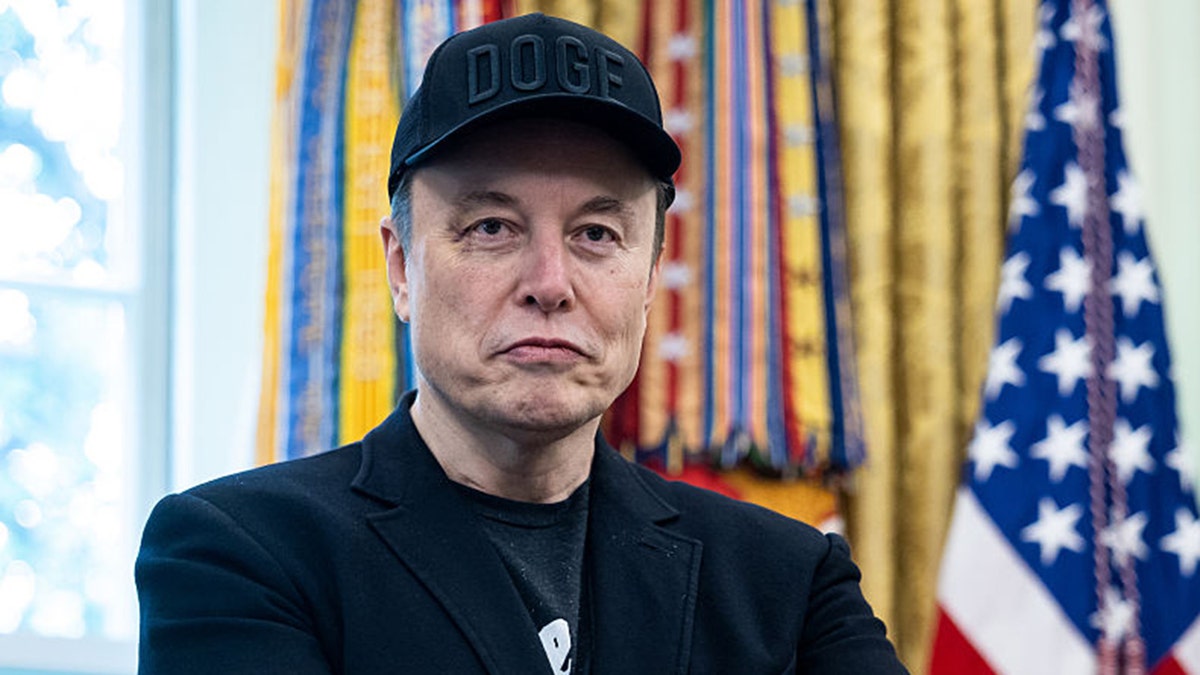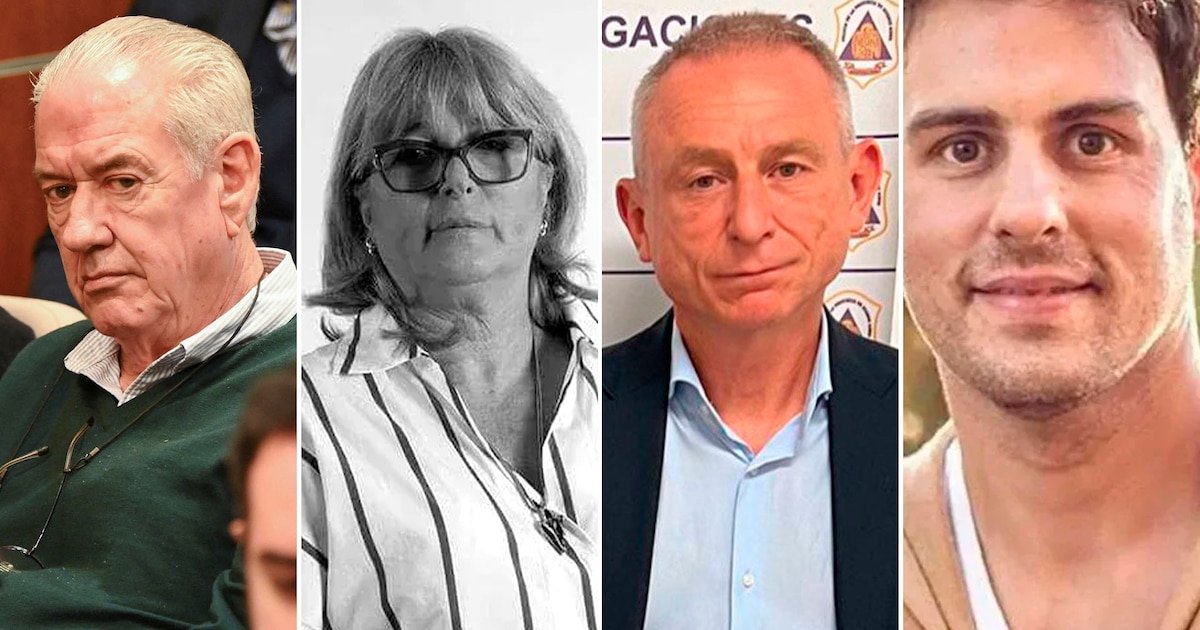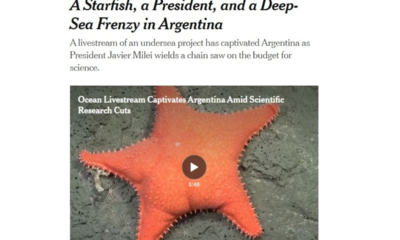INTERNACIONAL
Gov. DeSantis’ new DOGE task force gains momentum as universities, localities commit to being audited

Local jurisdictions and public universities in Florida are latching on to Gov. Ron DeSantis’ new state-level DOGE Task Force, including through formal resolutions, independent committees and additional resources supporting the new initiative.
DeSantis announced the creation of «Florida DOGE» in February, a program similar to the one led at the federal level by Elon Musk. The audit intends to utilize artificial intelligence and other measures to uncover hidden waste, review state university and college operations and spending, eliminate «redundant» boards or commissions, and examine entities’ spending habits. The initiative intends to ensure financial compliance with all state laws, provide recommendations and submit referrals to the appropriate enforcement agencies when necessary.
The governor subsequently sent out official guidance in March to various counties and municipalities, as well as to public colleges and universities, requesting they confirm their willingness to comply with the audit. The guidance also ordered the appointment of a proxy to be the primary point of contact throughout the initiative.
DEMOCRATIC SENATOR STATES HE ‘DOES NOT BELIEVE’ DOGE IS TACKLING WASTE IN FEDERAL AGENCIES
In response, some of Florida’s largest jurisdictions and public institutions – like Hillsborough County, the City of Jacksonville, and Florida Atlantic University – have signaled their willingness to comply with the audit. Their efforts include passing formal resolutions and creating independent committees to support the governor’s initiative.
The Florida DOGE initiative intends to «abolish» 70 redundant boards and commissions around the state, per a February press release from the governor’s office announcing the new auditing effort. (Getty Images/Fox News)
«Completing this DOGE audit is a no-brainer when you consider the inefficiencies we’ve already stumbled across – like old, forgotten bank accounts sitting there with millions of dollars just gathering dust,» said Hillsborough County Commissioner Joshua Wostal, who helped spearhead the resolution affirming the county’s willingness to open its doors.
In Jacksonville, the city created a «Duval DOGE» task force that has already begun conducting meetings and is zeroing in on tens of millions of dollars in capital improvement projects that have sat idle since 2023, according to WJXT Channel 4 in Jacksonville. This week, the «Duval DOGE» task force also launched a website to track the work being done with the ongoing audit.
ELON MUSK SAYS DOGE WILL INVESTIGATE ‘STRANGELY WEALTHY’ LAWMAKERS: ‘NOBODY CAN EXPLAIN THAT’

Several of Florida’s largest jurisdictions, in addition to some public universities and colleges, have affirmed their willingness to open their doors to the governor’s auditors. (Getty Images)
However, while residents in Jacksonville have been supportive of the effort, others have pushed back.
«DOGE is a misnomer, catchy misnomer for let’s see what we can take away from the working class, the needy, the elderly. We don’t need it,» Duval County resident Russell Harper said during a city hall meeting about the new «Duval DOGE» committee. Other residents complained that the «Duval DOGE» lacked adequate Democratic representation and was just an effort to gain favor with political elites.

Protesters rally outside the Theodore Roosevelt Federal Building, headquarters of the Office of Personnel Management, on Feb. 5, 2025, in Washington, D.C. (Alex Wong/Getty Images)
Diversity, Equity, and Inclusion (DEI) initiatives at public colleges and universities will also be part of the audit. The governor’s DOGE task force aims to ensure that no state funds support these programs, in line with a resolution passed by the state board of education last year prohibiting such spending.
CLICK HERE TO GET THE FOX NEWS APP
Florida DOGE also intends to «abolish» 70 redundant boards and commissions around the state, per a February press release from the governor’s office announcing the new audits.
«Florida was DOGE before DOGE was cool,» DeSantis spokesperson Brian Wright said in a statement to Fox News Digital. «Over the past five years, Florida, under Governor Ron DeSantis, has eliminated dozens of unnecessary boards, lifted needless regulations, and reduced spending. Florida has paid down 41% of our state’s debt, strengthened our economy, and increased our rainy-day fund by nearly $10 billion – all without raising taxes.»
Wostal said the new DOGE audit was a better response than just raising taxes to pay for needed services.
«Instead of the knee-jerk response of raising taxes – putting even more strain on already stretched households – it’s time for the government to turn the lens inward,» he said.
Florida,DOGE,State And Local,Politics
INTERNACIONAL
Fetterman joins fiscal hawks to sound alarm as national debt nears staggering $37T

NEWYou can now listen to Fox News articles!
The U.S. national debt is rapidly approaching $37 trillion with no signs of slowing down as President Donald Trump’s «big, beautiful bill» is projected to raise budget deficits by $2.4 trillion over a decade, according to the Congressional Budget Office (CBO) dynamic analysis.
Senators from both parties sounded the alarm on the staggering debt crisis in interviews with Fox News Digital on Capitol Hill.
«I’m very, very deeply concerned about that,» Sen. John Fetterman, D-Pa., said. «I think that’s gonna be part of the next big crisis, where we are gonna have to confront our national debt because it wasn’t that long ago that a trillion was unthinkable, and now that there’s 40 trillion approaching in our debt, we really have to address it, honestly.»
Trump signed his «one big beautiful bill» by Congress’ self-imposed July 4 deadline. It includes the fulfillment of Trump’s key campaign promises through the reconciliation process, including tax cuts and reforms to immigration, energy and Medicaid.
MAGA COUNTRY VOTERS SOUND ALARM OVER ‘RIDICULOUS’ NATIONAL DEBT AMID DEBATE OVER TRUMP-BACKED BILL
The U.S. national debt is more than $36 trillion. (Fox News Digital)
But conservative fiscal hawks, including Rep. Thomas Massie, R-Ky., who voted no and regularly sports a national debt clock badge, threatened to derail its passage as they spoke out against its contribution to the national debt.
DEMOCRAT-CONTROLLED BUDGET OFFICE WRONGLY ANALYZED TRUMP’S BIG BILL, MISSED RECORD SAVINGS, WHITE HOUSE SAYS
Sen. Katie Britt, R-Ala., a Trump ally and advocate for the bill, told Fox News Digital, «The time for tough conversations is now.»
She said the United States must continue to look for waste, fraud and abuse—a nod to former Trump-ally turned online foe, Elon Musk, who spearheaded efforts to cut government spending via the Department of Government Efficiency (DOGE) earlier this year, before a well-documented fallout between Trump.
«When you think of things like Social Security and Medicare, people say that they could be insolvent within the next eight years,» arguing that interest on the U.S. debt and mandatory spending on programs, like Medicaid, are taking up a big portion of the pie.

Elon Musk led the Trump administration’s effort to cut waste, fraud and abuse in government spending. ( Francis Chung/Politico/Bloomberg via Getty Images)
«We’ve got to make sure that we are more responsible with taxpayer dollars,» Britt added.
Meanwhile, freshman Sen. Bernie Moreno, R-Ohio, described the U.S. debt crisis as a «moral failing that we leave this country to our kids and grandkids with this kind of level of debt.»
«$37 trillion of debt is unimaginable, right? We’ve got to balance our budget. We need to do it right now. If we don’t do it, what’s going to happen is interest [rates] are going to go up. Inflation is not going to be under control. It’s real simple,» Sen. Rick Scott, R-Fla., told Fox News Digital.
Sen. Ron Johnson, R-Wisc., agreed, «We need to focus on spending, spending, spending. I’ve been beating this drum really since I got here, but particularly with this administration, since January 1st, trying to return to a reasonable pre-pandemic level spending.»

Demonstrators carry cardboard caskets in front of the U.S. Capitol in protest of President Donald Trump’s tax breaks and spending cuts package on Monday, June 30, 2025, in Washington, D.C. (AP Photo/Julia Demaree Nikhinson)
While Republicans have led the charge on eliminating waste, fraud and abuse in government spending, Sen. Ed Markey, D-Mass., said the number one priority should be reversing «all these massive tax breaks of billionaires and millionaires in America.»
Trump’s megabill included an extension of the 2017 Tax Cuts and Jobs Act (TCJA), as well as new tax breaks on tipped wages and overtime.
CLICK HERE TO GET THE FOX NEWS APP
Markey added, «We can save trillions and trillions of dollars that are going to be wasted in our country by giving these massive taxpayers by the trillions to the wealthiest. We also have to re-examine our defense budget. We actually don’t need a whole new generation of nuclear weapons.»
politics,senate,growing the debt,republicans,democrats senate
INTERNACIONAL
Zelenskyy says peace deal will not include giving territory to Moscow ahead of Trump-Putin summit

NEWYou can now listen to Fox News articles!
Ukrainian President Volodymyr Zelenskyy said Saturday that Ukraine will not give up any territory to Russia in efforts to reach a peace deal ahead of talks between President Donald Trump and Russian President Vladimir Putin next week.
Ukrainian President Volodymyr Zelenskyy said Ukraine will not «gift» land to Russia ahead of a Trump-Putin summit next week aimed at seeking a peace deal between the countries. (Antonio Masiello/Getty Image)
In a video posted on his social media accounts on Saturday, Zelenskyy addressed the war with Russia and said while he is ready for the conflict to end, Ukraine will not «gift» land to Moscow in the process.
«The answer to the Ukrainian territorial question already is in the Constitution of Ukraine. No one will deviate from this—and no one will be able to. Ukrainians will not gift their land to the occupier,» Zelenskyy said.
His remarks come after Trump talked about the upcoming summit at the White House on Friday, stating that a deal to end the war could include «swapping of territories.»
CLICK HERE TO GET THE FOX NEWS APP
This is a breaking news story. Check back for updates.
volodymyr zelenskyy,ukraine,world,russia,conflicts,vladimir putin,donald trump
INTERNACIONAL
De la inversión a la ruina: los once negocios que terminaron en grandes pérdidas para los ahorristas uruguayos

Miles y miles de uruguayos que tenían ahorros querían obtener mayores rendimientos. Entonces buscaron distintas opciones para invertir: algunos fueron a una corredora de bolsa tradicional, otros se volcaron por las opciones agropecuarias –promocionadas como el “negocio más seguro del país”–, hubo quienes pensaron en poner sus ahorros en ladrillos y los que fueron por alternativas más jugadas.
Miles y miles de uruguayos que colocaron sus ahorros en los últimos dos años en Uruguay también tienen algo en común: vieron cómo el dinero que habían puesto en alternativas para que rindieran mejor se esfumó.
Es que en los últimos dos años son al menos once los negocios financieros que tuvieron que admitir a sus clientes que no tenían dinero para devolverle. El motivo de muchos de estos era porque habían caído en un típico esquema Ponzi: el negocio no era rentable en sí mismo y las rentabilidades que pagaba a los clientes que salían se cubrían con la plata de los que entraban.
Así, los casos en la Justicia uruguaya, tanto la de concurso como la penal, se han acumulado y algunos empresarios esperan en la cárcel que avance el juicio que definirá si se los condena por estafa o lavado de activos.
La atención de las estafas en Uruguay de los últimos días se ha concentrado en los fondos ganaderos. Y, en particular, en el más grande de estos: Conexión Ganadera. La megaestafa incluso se convertirá en una obra de teatro musical con canciones icónicas.
Esta empresa, fundada en 1999, se dedicaba a captar el ahorro privado para comprar ganado con ese dinero. A cambio le ofrecía a sus clientes una rentabilidad fija del 7%, sin considerar que el negocio ganadero es en su esencia variable. Unas 4.300 personas habían confiado en este modelo y, ahora, vieron que su dinero se esfumó.

Pero la caída de Conexión Ganadera, uno de los casos de esquema Ponzi– no se puede entender sin el contexto de la crisis que atravesó el sector ganadero, ya que hubo un efecto dominó en estos casos. Primero fue el Grupo Larrarte y luego República Ganadera las empresas que entraron en quiebra y que admitieron que no tenían dinero para pagarle a sus inversionistas.
El Grupo Larrarte no era uno de los fondos ganaderos más conocidos de Uruguay, pero su caída fue el movimiento de la primera pieza del dominó que hizo caer al resto. El titular del grupo, Jairo Larrarte, fue imputado por delitos de estafa, apropiación indebida y liberación de cheques sin fondo. El empresario, en prisión preventiva, está acusado de montar un negocio ficticio en medio de un esquema piramidal que llegó a captar inversiones por USD 12 millones.

En orden cronológico, la segunda en problemas fue República Ganadera, en la que confiaron 1.450 inversionistas. La empresa reconoce que tenía un pasivo de USD 90 millones.
Después de la caída de estos dos fondos, uno de los socios de Conexión Ganadera, Gustavo Basso, murió en un accidente de tránsito. Todavía no se sabía que Conexión Ganadera también estaba con números rojos: tenía un pasivo de USD 230 millones. Faltaba todavía más tiempo para saber que, en realidad, Basso se había suicidado: la Justicia comprobó que su muerte se dio tras chocar voluntariamente contra una maquinaria vial.

Su socio, Pablo Carrasco, su viuda, Daniela Cabral, y la esposa de Carrasco, Ana Iewdiukow, ahora son investigados por la estafa. La Justicia ya los imputó por este delito. Además, a Carrasco se le sumó el delito de lavado de activo y lo envió en prisión preventiva, mientras avanza la investigación y a la espera del juicio sobre el caso.
Luego se conoció públicamente un cuarto caso: Portfolio Capital comunicó a sus clientes que no está pudiendo pagar los intereses ni devolver el capital anticipadamente ante la corrida de los inversores.
La seguridad de invertir en ladrillos se vio cuestionada con el caso Balsa. Según informó El País, el ingeniero en telecomunicaciones Juan Balsa se convirtió rápidamente en un exitoso desarrollador de barrios privados en Canelones. Pero comenzaron los rumores de problemas financieros que se confirmaron en un mail en abril de 2024, cuando les anunció a los inversores que había solicitado el concurso de acreedores.
Las deudas eran por USD 65 millones y resolvió negociar convenios con los inversores.
La corredora de bolsa Sara Goldring vio cómo el valor de los títulos de sus clientes se desplomaba y decidió esconder esa información. La desvalorización estaba explicada, de acuerdo a su versión, por la debacle que tuvieron durante la pandemia las acciones de empresas que cotizaban en Nasdaq.
Fue en 2022 que la corredora informó que enfrentaba pérdidas millonarias y una investigación reveló que utilizaba fondos de algunos inversores para compensar las pérdidas de otros. Ahora Goldring busca negociar un acuerdo con el Banco Central del Uruguay (BCU) y los damnificados, pero no ha podido concretarlo porque en Estados Unidos mantiene fondos embargados, informó El Observador.

Custodia de Valores Mobiliarios –la corredora de bolsa de Goldring– no es la única que tuvo problemas. Grupo Bursátil Uruguayo también fue intervenida por el BCU por no cumplir con los “estándares de aptitud, rectitud comercial y profesional”, los principios de “ética” y tener “otros graves incumplimientos”, consignó El País. En la corredora de bolsa De Baeremaecker y Perera una empleada fue condenada como responsable de una estafa millonaria.
Recientemente, Ignacio González Palumbo, un supuesto corredor de bolsa que ostentaba una vida de lujo, fue acusado por haber estafado hasta a su propia familia.
El 9 de julio de 2023, Infobae informó que la tecnológica Wenance reconoció que estaba reprogramando pagos de intereses a clientes que depositaron fondos en la firma. El CEO de la empresa, Alejandro Muszak, pretendía que el negocio de Uruguay sea una isla y no fuera afectado por la operativa argentina, pero fue imposible. El empresario fue denunciado por unas 600 personas que dicen haber sido estafadas por USD 20 millones. El CEO intentó negociar con ellos, pero no tuvo éxito.

Para los denunciantes, el modelo de negocios de Muszak terminó redundando en un “verdadero esquema Ponzi” o una “estafa piramidal”.
El empresario Gonzalo Campomar logró, a través del boca a boca, que ahorristas invirtieran su dinero en criptomonedas y billeteras virtuales, informó El País. La rentabilidad anual en algunos casos podía ser de un 50%, una cifra extremadamente alta si se la compara con lo que suele pagar el mercado uruguayo.
Campomar, un ex jugador de rugby, acumuló una deuda de USD 65 millones y huyó del país.
Corporate Events,Crime,South America / Central America,MONTEVIDEO

 DEPORTE3 días ago
DEPORTE3 días agoRakitic, obligado a pedir disculpas tras felicitar a Modric por su fichaje

 POLITICA2 días ago
POLITICA2 días agoLa oposición logró la media sanción para el aumento del financiamiento universitario y desafía a Milei

 POLITICA2 días ago
POLITICA2 días agoLa foto de Javier Milei con los candidatos de La Libertad Avanza en Buenos Aires: “Kirchnerismo nunca más”



































